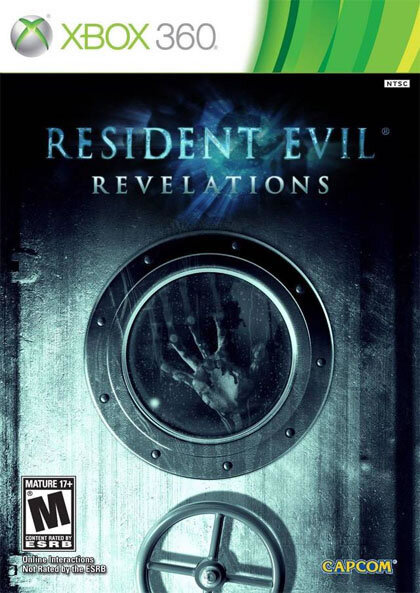- CLASSIC MAGAZINES
- REVIEW CREW
A show recapping what critics thought back
when classic games first came out! - NEXT GENERATION'S BEST & WORST
From the worst 1-star reviews to the best
5-stars can offer, this is Next Generation! - NINTENDO POWER (ARCHIVE)
Experience a variety of shows looking at the
often baffling history of Nintendo Power! - MAGAZINE RETROSPECTIVE
We're looking at the absolutely true history of
some of the most iconic game magazines ever! - SUPER PLAY'S TOP 600
The longest and most ambitious Super NES
countdown on the internet! - THEY SAID WHAT?
Debunking predictions and gossip found
in classic video game magazines! - NEXT GENERATION UNCOVERED
Cyril is back in this spin-off series, featuring the
cover critic review the art of Next Generation! - HARDCORE GAMER MAGAZING (PDF ISSUES)
Download all 36 issues of Hardcore Gamer
Magazine and relive the fun in PDF form!
- REVIEW CREW
- ELECTRONIC GAMING MONTHLY
- ELECTRONIC GAMING MONTHLY RANKS
From Mario to Sonic to Street Fighter, EGM
ranks classic game franchises and consoles! - ELECTRONIC GAMING MONTHLY BEST & WORST
Counting down EGM’s best and worst reviews
going year by year, from 1989 – 2009! - ELECTRONIC GAMING BEST & WORST AWARDS
11-part video series chronicling the ups and
downs of EGM’s Best & Worst Awards!
- ELECTRONIC GAMING MONTHLY RANKS
- GAME HISTORY
- GAME OVER: STORY BREAKDOWNS
Long-running series breaking down game
stories and analyzing their endings! - A BRIEF HISTORY OF GAMING w/ [NAME HERE]
Real history presented in a fun and pithy
format from a variety of game historians! - THE BLACK SHEEP
A series looking back at the black sheep
entries in popular game franchises! - INSTANT EXPERT
Everything you could possibly want to know
about a wide variety of gaming topics! - FREEZE FRAME
When something familiar happens in the games
industry, we're there to take a picture! - I'VE GOT YOUR NUMBER
Learn real video game history through a series
of number-themed episodes, starting at zero! - GREAT MOMENTS IN BAD ACTING
A joyous celebration of some of gaming's
absolute worst voice acting!
- GAME OVER: STORY BREAKDOWNS
- POPULAR SHOWS
- DG NEWS w/ LORNE RISELEY
Newsman Lorne Riseley hosts a regular
series looking at the hottest gaming news! - REVIEW REWIND
Cyril replays a game he reviewed 10+ years
ago to see if he got it right or wrong! - ON-RUNNING FEUDS
Defunct Games' longest-running show, with
editorials, observations and other fun oddities! - DEFUNCT GAMES QUIZ (ARCHIVE)
From online quizzes to game shows, we're
putting your video game knowledge to the test!- QUIZ: ONLINE PASS
Take a weekly quiz to see how well you know
the news and current gaming events! - QUIZ: KNOW THE GAME
One-on-one quiz show where contestants
find out if they actually know classic games! - QUIZ: THE LEADERBOARD
Can you guess the game based on the classic
review? Find out with The Leaderboard!
- QUIZ: ONLINE PASS
- DEFUNCT GAMES VS.
Cyril and the Defunct Games staff isn't afraid
to choose their favorite games and more! - CYRIL READS WORLDS OF POWER
Defunct Games recreates classic game
novelizations through the audio book format!
- DG NEWS w/ LORNE RISELEY
- COMEDY
- GAME EXPECTANCY
How long will your favorite hero live? We crunch
the numbers in this series about dying! - VIDEO GAME ADVICE
Famous game characters answer real personal
advice questions with a humorous slant! - FAKE GAMES: GUERILLA SCRAPBOOK
A long-running series about fake games and
the people who love them (covers included)! - WORST GAME EVER
A contest that attempts to create the worst
video game ever made, complete with covers! - LEVEL 1 STORIES
Literature based on the first stages of some
of your favorite classic video games! - THE COVER CRITIC
One of Defunct Games' earliest shows, Cover
Critic digs up some of the worst box art ever! - COMMERCIAL BREAK
Take a trip through some of the best and
worst video game advertisements of all time! - COMIC BOOK MODS
You've never seen comics like this before.
A curious mix of rewritten video game comics!
- GAME EXPECTANCY
- SERIES ARCHIVE
- NINTENDO SWITCH ONLINE ARCHIVE
A regularly-updated list of every Nintendo
Switch Online release, plus links to review! - PLAYSTATION PLUS CLASSIC ARCHIVE
A comprehensive list of every PlayStation
Plus classic release, including links! - RETRO-BIT PUBLISHING ARCHIVE
A regularly-updated list of every Retro-Bit
game released! - REVIEW MARATHONS w/ ADAM WALLACE
Join critic Adam Wallace as he takes us on a
classic review marathon with different themes!- DEFUNCT GAMES GOLF CLUB
Adam Wallace takes to the links to slice his way
through 72 classic golf game reviews! - 007 IN PIXELS
Adam Wallace takes on the world's greatest spy
as he reviews 15 weeks of James Bond games! - A SALUTE TO VAMPIRES
Adam Wallace is sinking his teeth into a series
covering Castlevania, BloodRayne and more! - CAPCOM'S CURSE
Adam Wallace is celebrating 13 days of Halloween
with a line-up of Capcom's scariest games! - THE FALL OF SUPERMAN
Adam Wallace is a man of steel for playing
some of the absolute worst Superman games! - THE 31 GAMES OF HALLOWEEN
Adam Wallace spends every day of October afraid
as he reviews some of the scariest games ever! - 12 WEEKS OF STAR TREK
Adam Wallace boldly goes where no critic has
gone before in this Star Trek marathon!
- DEFUNCT GAMES GOLF CLUB
- DAYS OF CHRISTMAS (ARCHIVE)
Annual holiday series with themed-episodes
that date all the way back to 2001!- 2015: 30 Ridiculous Retro Rumors
- 2014: 29 Magazines of Christmas
- 2013: 29 Questionable Power-Ups of Christmas
- 2012: 34 Theme Songs of Christmas
- 2011: 32 Game Endings of Christmas
- 2010: 31 Bonus Levels of Christmas
- 2009: 30 Genres of Christmas
- 2008: 29 Controls of Christmas
- 2007: 34 Cliches of Christmas
- 2006: 33 Consoles of Christmas
- 2005: 32 Articles of Christmas
- 2004: 31 Websites of Christmas
- 2003: 29 Issues of Christmas
- 2002: 28 Years of Christmas
- 2001: 33 Days of Christmas
- NINTENDO SWITCH ONLINE ARCHIVE
- REVIEW ARCHIVE
- FULL ARCHIVE
Resident Evil: Revelations
Contrary to what the title would have you believe, there aren't any earth-shaking revelations in Capcom's newest Resident Evil game. In fact, nothing about this modestly-sized adventure fills in gaps in the Resident Evil mythology, instead opting to weave an entirely new story that barely connects with the numbered sequels. What we're left with is a fun, if not familiar, side-story with plenty of mutated monsters and exploding set pieces.
Released a year ago on the Nintendo 3DS, Resident Evil: Revelations is the first game in the franchise to go from a handheld to current generation console. The release order may be unorthodox, but fans of the long-running survival horror franchise will feel right at home in this better looking PC port. It may not be the next-generation Resident Evil we're waiting for, but at least it will wash away the bad taste of Resident Evil 6.
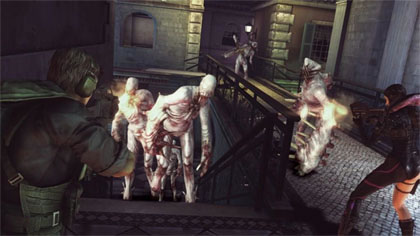
Outside of appearances from Jill Valentine, Chris Redfield and a passing mention to the now-defunct Umbrella Corporation, Revelations barely has anything to do with the Resident Evil series. If Capcom wanted to, they could have just as easily slapped on new characters and changed the name, not unlike what they did with Dino Crisis and Devil May Cry.
The story revolves around a terrorist group who is threatening to pollute the seas with a brand new virus, thus turning the underwater life into unstoppable, blood-crazed monsters. Jill Valentine (survivor of Resident Evil 1, 3 and 5) is joined by Parker, a brand new character with a thick accent. Together they are sent to an abandoned luxury cruise ship in the Mediterranean Sea.
At the same time, Chris Redfield and his partner, Jessica, are searching through snowy mountains for information on the terrorist organization. It doesn't take long for everybody to realize that Jill and Parker have been sent into a trap, and the rush is on to rescue the two agents and stop the terrorist's nefarious plans.
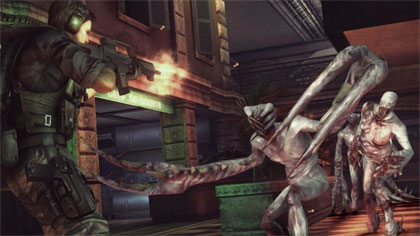
Taking a cue from episodic television shows, Resident Evil: Revelations is split up into 12 individual episodes (yes, the game calls them episodes). The episode structure allows the developers to tell several different stories at once, each adding up to a big twist ending. Players will bounce around through time, jump from place to place and see events from a half dozen points of view. And to make it feel even more like a TV show, each episode starts with a brief recap to bring players up to speed. Just about the only thing missing are commercial breaks and previews for the next episode.
Think a luxury cruise liner will be a welcome change of pace to the usual Resident Evil locales? Think again, because nearly every section of the ship feels like it was pulled out of a different (sometimes better) Resident Evil game. Even if it's not a proper mansion, it's clear that Capcom can't stay away from that motif. Thankfully there's a gentle sway back and forth to remind us that we are indeed on a boat, otherwise I would have completely forgotten.
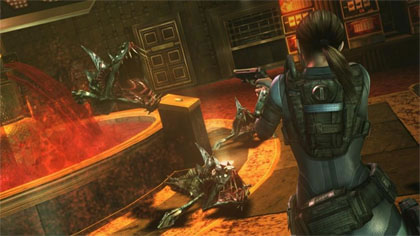
With the exception of Chris and Jill (and possibly Parker, if you're feeling generous), the supporting cast is mediocre at best. Jessica wears the most outrageous wet suit I've ever seen and never once has anything interesting to say. Raymond looks like the Joker, as performed by Conan O'Brien. And then we're introduced to Quint Cetcham and Keith Lumley, the Jar Jar Binks of Resident Evil. These two loudmouthed jokesters are here to remind you that there once was a time when this franchise was considered scary.
From a storytelling standpoint, switching between characters makes a lot of sense. We're able to see it all unfold like never before, giving the player a better understanding of what the story means. But as narratively convenient as it is, I found that it worked against the spirit of Resident Evil. Part of what makes these games scary is the feeling that you're all by yourself. In Revelations, you're always aware that Jill is not alone. Not just in the always-present computer-controlled partner, but also with other characters working their hardest to save the day. A lot of the tension that is created early in the game is squandered by episodes that take us too far away from what's interesting.
Anybody familiar with Resident Evil 5 will feel right at home with Revelation's control scheme. For better or worse, this is a third-person shooter with occasional jump scares. No matter who you control, everybody is able to hold three upgradable weapons and an assortment of grenades. Observant players will find just enough ammo lying around to keep the always evolving enemies at bay. And you won't need to worry about mixing herbs anymore; nearly every element has been streamlined and simplified.
Unfortunately, not every element has been streamlined. Half way through the game, Revelations introduces underwater exploration. If you thought Resident Evil's controls were clunky on land, wait until you're forced to hold your breath underwater. Even the simplest tasks were made needlessly complicated thanks to poor swimming controls. Far too much of the game relies on this questionable mechanic.
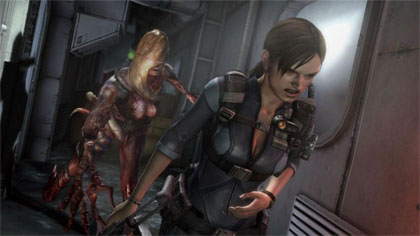
Despite some misgivings, there are moments when I was genuinely impressed with Resident Evil: Revelations. At one point the game's world becomes a Michael Bay disaster movie, making way for one of my favorite set pieces in the franchise's storied history. Unfortunately, there isn't enough of that. There are a lot of rehashed ideas found in Revelations, enough to distract me from an otherwise interesting thriller.
As far as HD ports of Nintendo 3DS games go, Resident Evil: Revelations is the best looking. The backgrounds are sharp and the characters looked really good on my computer monitor. It's a vast improvement over the handheld version, though a noticeable step down from Resident Evil 6. With massive boss battles and some pretty goofy costumes to unlock, I don't think too many people will be disappointed with Revelation's graphics.
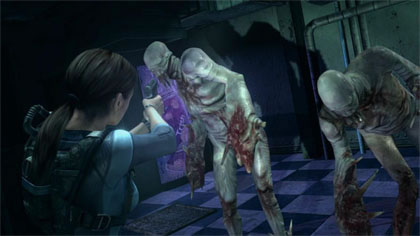
No matter how pretty the graphics are or what hell you put Jill Valentine through, it seems clear that Capcom is out of ideas for Resident Evil. Now that they've solved all of the main series mysteries, Capcom is at a point where they need to push the reset button and start fresh. None of the new mysteries found in Revelations are especially interesting, and I ultimately found myself more frustrated than intrigued.
But it's worse than a few unappealing mysteries. The real problem is in the writing, and how it seems to gloss over incredibly important information. Early on, Revelations spends a couple minutes talking about Terragrigia, a city that was literally destroyed by a giant light-shooting satellite in the sky. The game comments that this is the same thing that happened in Raccoon City; the government decided to simply wipe out the city instead of curing the problem. Even if you buy into their comparison, the problem still remains that we have no emotional attachment to Terragrigia. I cared about Raccoon City because I saw what happened to that city from multiple points of view. In Revelations, we're asked to have to same level of attachment to a city that's all but mentioned in passing.
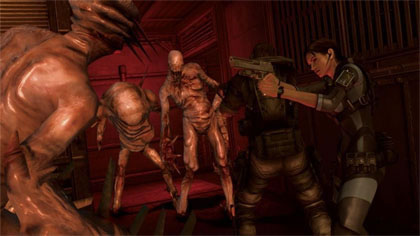
And I found that level of lazy writing throughout the game. At one point the terrorist leader unmasks to reveal his true identity. It's the kind of big reveal a TV show will lead up to, finally unmasking the mysterious figure during sweeps week. But here the man takes off the mask and reveals that he's a brand new character, one we'll spend no time getting to know. He is so two-dimensional than the only thing I remember about his character is that looks exactly like Walter White on Breaking Bad.
Resident Evil: Revelations is simultaneously a step in the right AND wrong direction. On one hand, it's certainly an improvement over Resident Evil 6. Then again, it's also a game that hangs on to too much of what makes this franchise so vexing. There are some good ideas here, but ultimately there are far better Resident Evil games on the market.
HOME |
CONTACT |
NOW HIRING |
WHAT IS DEFUNCT GAMES? |
NINTENDO SWITCH ONLINE |
RETRO-BIT PUBLISHING
Retro-Bit |
Switch Planet |
The Halcyon Show |
Same Name, Different Game |
Dragnix |
Press the Buttons
Game Zone Online | Hardcore Gamer | The Dreamcast Junkyard | Video Game Blogger
Dr Strife | Games For Lunch | Mondo Cool Cast | Boxed Pixels | Sega CD Universe | Gaming Trend
Game Zone Online | Hardcore Gamer | The Dreamcast Junkyard | Video Game Blogger
Dr Strife | Games For Lunch | Mondo Cool Cast | Boxed Pixels | Sega CD Universe | Gaming Trend
Copyright © 2001-2025 Defunct Games
All rights reserved. All trademarks are properties of their respective owners.
All rights reserved. All trademarks are properties of their respective owners.










